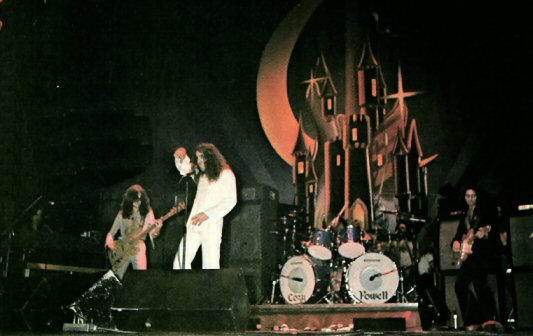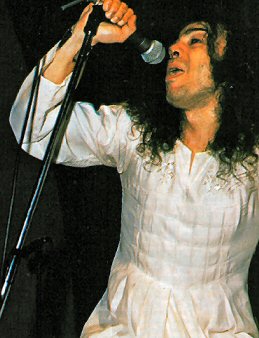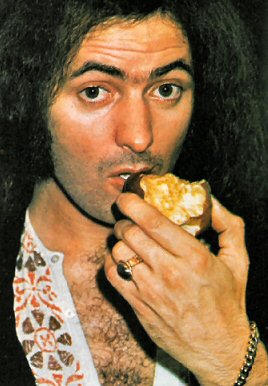|
Ritchie Blackmore & Ronnie James Dio Nearer My Dio To Thee  There's a rumor circulating that Ritchie Blackmore is having a Stratocaster grafted to his lower abdomen. It is not true. Even though the blackclad figure on the dry-iced stage is supposed to be one with his axe, Blackmore insists that his cello practice is more engrossing.
There's a rumor circulating that Ritchie Blackmore is having a Stratocaster grafted to his lower abdomen. It is not true. Even though the blackclad figure on the dry-iced stage is supposed to be one with his axe, Blackmore insists that his cello practice is more engrossing."It's one of those instruments that alters with your mood," he explained after a recent verbal bout with Rainbow singer Ronnie Dio. The Blackmore-Dio duo has resulted in a new, renewed round of heavy metal rock, most recently captured on Rising, Rainbow's latest Polydor LP. We can thank Ritchie personally for preserving the bone-crunching form from extinction under an onslaught of "figaros" and soft-rock noodling. Thanks, Ritchie.-(Ed.) RONNIE JAMES DIO Cohen: What were you doing the moment before you decided to join Blackmore's Rainbow? Dio: I was standing at a bar. Cohen: The alchohol helped you decide. Dio: I think Ritchie's a brilliant guy, a really brilliant guy. I would think I chose Ritchie because I think he's a winner. Cohen: I don't know if mystical is part of your vocabulary, but do you think some force may have chosen the two of you? Dio: I know what you mean. What you're getting at is, am I in agreement with a lot of Ritchie's mystical beliefs. Cohen: I wanted to know if you thought it possible that some force brought you together. Dio: Oh, I see. I never give it any conscious thought. I just think it's professionals getting together. Ritchie needed a lead singer and I like to think I needed a lead guitar player as well. Our paths happened to cross. Cohen: Do you consider yourself a singer or a musician? Dio: Well, in Elf, the only band I can relate to because I had never been in another band aside from Elf, I was a bass player as well as a singer. I also wrote the songs on all three of the Elf albums we did. So I also consider myself to be a songwriter. Cohen: Have you ever written prose? Dio: No, I never have. The only time I'll write prose is to a melody. I don't consider myself to be a poet at all. I consider myself to be a musician first.  Cohen: When you write, are you aware of a process?
Cohen: When you write, are you aware of a process?Dio: Usually it's a very long one. It depends on what you've been doing recently. After being on the road for so long, and in the studios, you get damn well sick of doing anything musical, and you want to get away from it - like not wanting to take the bus if you're a bus driver on your holiday. You kinds have to get yourself in a state of mind to write. You have to say 'Get off your ass and back to work.' And then, as soon as I go into my den where I have all my gear set up, I put on head phones, plug in my guitar and my tape recorder, and just wail away for hours. It starts with a little germ of an idea and I'll lay it down on the tape recorder. Then I'll go and watch television for a day and then come back and pick up on that idea again. From the time I know I have to start writing until the time the song should be finished, it usually takes about six months. Cohen: Does TV inspire you? Dio: I'll tell you, this is really weird, I've always found that I've written my best songs while watching a sports program-football, basketball, anything that doesn't have music in it. Anything that has a constant bantering of words for some reason soothes me. Sports soothe me. I'll watch any kind of sport, from ping-pong to chair throwing. Cohen: Who do you root for? Dio: I used to be a real Ranger fan until they traded Brad Park and Ratelle. I would have to say that in hockey, Philadelphia is my team at the moment. I've always liked winners. In baseball, the Yankees have always been my favorite team-still are. Cohen: Do you think musicians are a bit like athletes? Dio: I've always considered people in bands to be not unlike athletes. Usually I use it kind of like a football team. I would consider a lead guitar player, especially one of Ritchie's caliber, as quarterback-although there are some bands where the lead guitar player doesn't take command of the band, and I would equate them with a wide receiver or possibly with a really brilliant running back. I would equate the drummer to be fullback, because he's the crux of the offense, and I don't think you can think of a band being a defense unit. I think the singer, if he was going to be the one in charge of the band, would be quarterback as well, or else he could be the wide receiver. The lead singer and lead guitar player are more of the glamor parts of the band. The bass player would have to be some kind of lineman, maybe the center, and the keyboard player would have to be maybe a tight end or, if he plays synthesizer as ours does, could be the rest of the line. Cohen: Do you ever write about sports? Dio: I never do. I think it's a rather corny subject to write songs about. I would write a song about athletics in a humorous vein, but probably only one song. My songs usually lean towards the mystical. Cohen: Do you like to be alone when you write? Dio: Yes, I do. Cohen: Do your songs tend to be autobiographical? Dio: Sometimes they do. In fact, probably they all do in some way. It's probably some form of selfanalysis. Dio: Do you keep a diary? Cohen: No, I don't keep a diary and I hardly ever keep receipts. I like to think of myself as a tidy person. Cohen: Do you sing in the shower? Dio: No. I never sing unless I'm performing. Cohen: Did you form your first rock band to meet girls? Dio: That was probably some of it. When I first started there was a great attraction to rock musicians, obviously. But if that was true, I probably changed very soon because the music became a lot more important to me than the chicks. I'd rather go out and play than go out and find chicks. They always come to you anyway. Cohen: What would you most want to know about Ritchie Blackmore? Dio: I'd like to know how in the world he managed to acquire such a perfect sense of timing, and how he can tell, by the tiniest hair, whether a song is a little fast or slow. RITCHIE BLACKMORE Cohen: How in the world did you acquire such a perfect sense of timing? Blackmore: I was brought up on a metronome, so I always notice if someone's playing slightly fast or slow. It's very important because when people dance to a record or listen to you, they don't know you're speeding up or playing slower. All they know is that something's wrong. Cohen: Do you have a feel for numbers as well? Blackmore: Yeah, they have their place. I won't stay in a room that adds up to 13. Like if the number of the room is 607. I noticed it when I went down with hepatitis. Two weeks before I went down with it I wasn't feeling too well and did notice the numbers on my door. I tended to add them up because I was bored and I noticed that in nearly every hotel where I stayed I got a room that added up to 13. So the next tour-I'm very superstitious by nature-my mother taught me all that because she had a lot of gypsy friends. I can't cut my nails on Sunday, I won't cross anybody on the stairs, I won't... there's so many incredible things. Cohen: Like what else? Blackmore: Wear green on stage, whistle backstage, go out on Sundays, there's a million of them. Cohen: You must look over your shoulder a lot. Blackmore: Well, I always believe in being prepared. That's why I never get too drunk. What I don't like is when people pull guns on me. I'm not too keen on that. Whenever I sit somewhere, I always sit with my back to the wall so nobody can come up behind me. And at night I always sleep with various kinds of implements around my bed. If anyone broke into my house they'd get a shock as to what they would find. I'm always on guard because I'm suspicious by nature.  Cohen: When people first meet you they must find it unpleasant.
Cohen: When people first meet you they must find it unpleasant.Blackmore: They find me a right bastard. Cohen: Do you go after what you want or does it come to you? Blackmore: I aim for it and let it come to me. Cohen: You needed a lead singer. Did Ronnie come to you? Blackmore: Yeah. Because I knew him through some other people and I'd been touring with him and I'd been watching him sing and listening to his voice. Cohen: Do you think your relationship to your lead singer is more special than the relationship between other band members? Blackmore: Yeah, because some of the music that I like to play is hard to sing and sometimes presents a problem. I like exciting music that will hit an audience. I don't like playing just a couple of chords and the singer wails away. I like it to be a 50-50 arrangement. I also like to hear a lead singer sing. I don't like to take a million guitar solos. Cohen: Do you think you and him are together for reasons other than his voice - more of a cosmic reason? Blackmore: Yeah, he was one of the guys who fell to Earth and I found him in a ditch. Cohen: Anything else? Blackmore: Yeah. He doesn't eat vegetables. Cohen: How was your song "Yoga For Health" written? Blackmore: I was watching that program "Yoga For Health" and it gave me an idea. And the melody of "Temple The King" is similar, but it's not similar because somewhere along the line I kind of distorted it. But that's what it was inspired by, I was inspired by the relaxing part of it. Cohen: Is there somewhere special you like to write? Blackmore: Yeah, in cars and especially in planes. The altitude for some reason gives me... but I never have a guitar around to write. But I always get good ideas on a long distance flight. Cohen: When you're playing a solo and really get out there, are you communicating with other musicians who are no longer alive? Blackmore: Yes, because I believe in afterlife and I believe there's people watching you and seeing how you're getting on. I believe they're listening to you in the same way that anyone else listens to you. They say 'nice' or 'not so good.' They have the advantage of being lots of places at the same time. They listen to a lot of music. Cohen: After you die, can you see these people? Blackmore: Oh yeah, I think so. Cohen: You can visit your grandfather? Blackmore: Oh yeah, definitely. Cohen: Have you had situations that proved this to you? Blackmore: Yes. Psychic research is my hobby and I'm into knowing about reincarnation and psychic phenomena. I've indulged in seances. I believe in God. I'd like to get closer to God by indulging in seances. Cohen: Can you be playing something and have it be like you're hearing it for the first time? Blackmore: No. I never hear what I play. I'm always thinking ahead of what I'm playing so I don't hear exactly what I'm playing. There's too much going on for me to sit down and hear what I'm playing. I just play it. Cohen: As if your fingers had a mind of their own? Blackmore: No. When they do, that's when I play badly. As soon as the head has stopped controlling, you're in trouble. The head has to be in a good position and you have to be completely oblivious to your surroundings, which I am. Usually if I play well onstage, I could be anywhere. Cohen: Are you usually the center of attention, the leader of your pack? Blackmore: No, no, I was always the odd one out. I always wanted to do anything that was considered to be wrong. That's why I didn't take up smoking. Everyone used to smoke at school. Maybe if they hadn't smoked I would have. Cohen: Do you tend to do things that you're the best at? Blackmore: I don't know. I like to laugh when other people are crying and I like to cry when other people are laughing. It sets off a really weird reaction in me. Cohen: What do you love doing? Blackmore: I love to shock, if I can - to get people to kind of move themselves. Cohen: Who shocks you the most? Blackmore: My father. He thinks very differently than me and he's one person I can't shock. He knows too much. Cohen: What does he do? Blackmore: He works at a kind of an airport. He maps out runways and things for landing aircraft. Cohen: Do you get a sense of flying from your music? Blackmore: No. You can say that I astral project when I'm playing well. I'll go into all the corners of the actual theater I'm playing in. Cohen: What do you dislike most? Blackmore: People. People who hold a guitar or a microphone and look very nice, but have nothing to offer and give music a bad name. Especially heavy metal music. I won't have anything to do with those types of people. Cohen: Do you have a dog? Blackmore: Yes. Naturally, a black one. © Scott Cohen, Circus, 10 August 1976 |